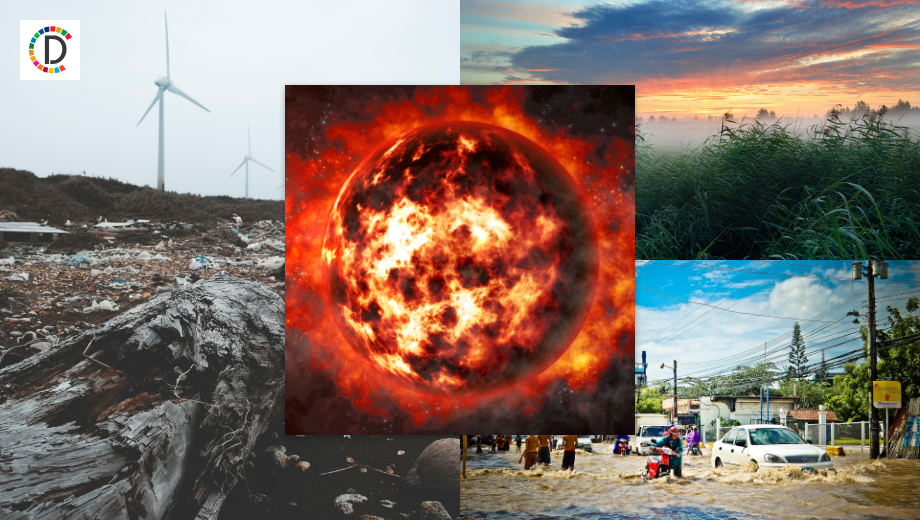Researchers warn of extreme heat impact on outdoor workers, call for awareness, fewer hours
Researchers have warned about the detrimental effects of extreme heat on outdoor workers in India, as temperatures rise in the April-June period. The India Meteorological Department predicts above-normal temperatures and an increase in heatwave days. Studies show that heat and humidity can impact workers' health, with pregnant women at risk of adverse pregnancy outcomes. Adaptation measures and awareness are crucial to protect vulnerable workers.

- Country:
- India
As the country braces for extreme heat in the April-June period with the temperatures already starting to rise, researchers have sounded the alarm over detrimental effects it can have on outdoor workers in farming, construction and other sectors.
The India Meteorological Department recently said above-normal maximum temperatures were likely over most parts of the country in April-June this year, and the central and western peninsular parts are expected to face the worst impact. Above-normal heatwave days are likely over most parts of the plains, it said.
Following the adverse weather warning, researchers are advocating for novel ways of working outdoors, including flexible hours and mandatory breaks, to help workers adapt to the effects of heat, made increasingly humid because of climate change.
''Dry heat is relatively easier to handle. When the body heats up and we drink water, there is evaporation and the body cools down. However, in humid heat, evaporation reduces because of high moisture in the air which hampers the body's cooling mechanism,'' Vimal Mishra, Vikram Sarabhai Chair Professor, Civil Engineering and Earth Sciences, IIT Gandhinagar, told PTI.
''Doing intensive labour in such conditions can raise body heat to a level where it can also cause mortality,'' he warned.
An international study examining how tropical heat impacts outdoor workers has found that for one degree Celsius of additional warming, roughly 800 million people will live in areas needing hours of heavy work to be cut down by more than half over the entire year.
In other words, ''one degree Celsius of additional warming, heat, and humidity, will hinder the ability of one in eight people living in the tropics to safely work (outdoors) during most daylight hours,'' Mishra, the study's co-author, wrote in a comment for Nature India, an online publication of the Nature Portfolio.
The study, co-led by the US-based Paul G Allen Family Foundation, was published in the journal One Earth in March 2024.
According to the study, the world is edging closer to breaching the temperature goals of the Paris Agreement, with heat and humidity levels in the tropics having been studied to be closer than ever to human tolerance thresholds.
The increasingly humid heat is likely to affect outdoor workers in Africa and Asia the most because of their large working-age populations, likely to rise in coming decades, coupled with high reliance on agriculture, forestry and fisheries, the authors said.
Another study, conducted in Tamil Nadu and published in October last year, found that occupational exposure to extreme heat more than doubled the risk of miscarriage in pregnant women, with the heat generally raising the overall risk of adverse pregnancy and birth outcomes.
''We also observed that because of limited access to toilets, the women were eating and drinking less, resulting in malnutrition. This too can impact pregnancy outcomes,'' Vidhya Venugopal, the study's corresponding author and professor at the Faculty of Public Health of the Sri Ramachandra Institute of Higher Education and Research in Chennai, told PTI.
The study assessed 800 pregnant women, 47 per cent of whom were exposed to heat while working outdoors.
Among the women exposed to extreme heat, 6.1 per cent had still and preterm births, compared to 2.6 per cent of the women exposed to heat within safe limits, it said.
Further, 8.4 per cent of the women exposed to high heat levels birthed babies having low weight, compared to 4.5 per cent of the women exposed to safe levels of heat, the ''first-of-its-kind'' study to be conducted in India found. It is published in the British Journal of Obstetrics and Gynaecology.
''Biologically, the external heat adds to the internal heat generated in pregnant women because of hormones. So, when these women sweat in the heat, the blood flow rushes more towards their organs, which lowers the amount flowing towards the foetus, thereby hindering their growth and development,'' Venugopal said.
Mishra said that unless adaptation measures were implemented, the vulnerable tropical outdoor workers were in store for a future with more extreme heat, accompanied by more pronounced adverse impacts.
The researchers also called for the empowerment of outdoor workers by raising their self-awareness and agency in decision-making.
''We suggest workers to avoid labour under harsh conditions. We also suggest fewer working hours with changes in working routine in line with the external ambient conditions. We further advise workers to take breaks, which can also be mandated by agencies employing them,'' Mishra added.
Venugopal said outdoor women workers needed to be made more aware of the effects of extreme heat on their health and that primary healthcare centres can play an important role.
''Through primary healthcare centres, which the women frequent during their gestation period, they can be sensitised about how the extreme heat is impacting them and their offspring's health. The government can adopt such measures in mitigating the effects of extreme heat on outdoor women workers,'' she said.
(This story has not been edited by Devdiscourse staff and is auto-generated from a syndicated feed.)
- READ MORE ON:
- Vikram Sarabhai Chair
- Vidhya Venugopal
- Mishra
- The India Meteorological Department
- Africa
- Vimal Mishra
- Earth
- Venugopal
- Tamil Nadu
- Paul G Allen Family Foundation
- Asia
- Higher Education
- Nature India
- Research in Chennai
- Earth Sciences
- Nature Portfolio
- India
- IIT Gandhinagar
- Civil Engineering










